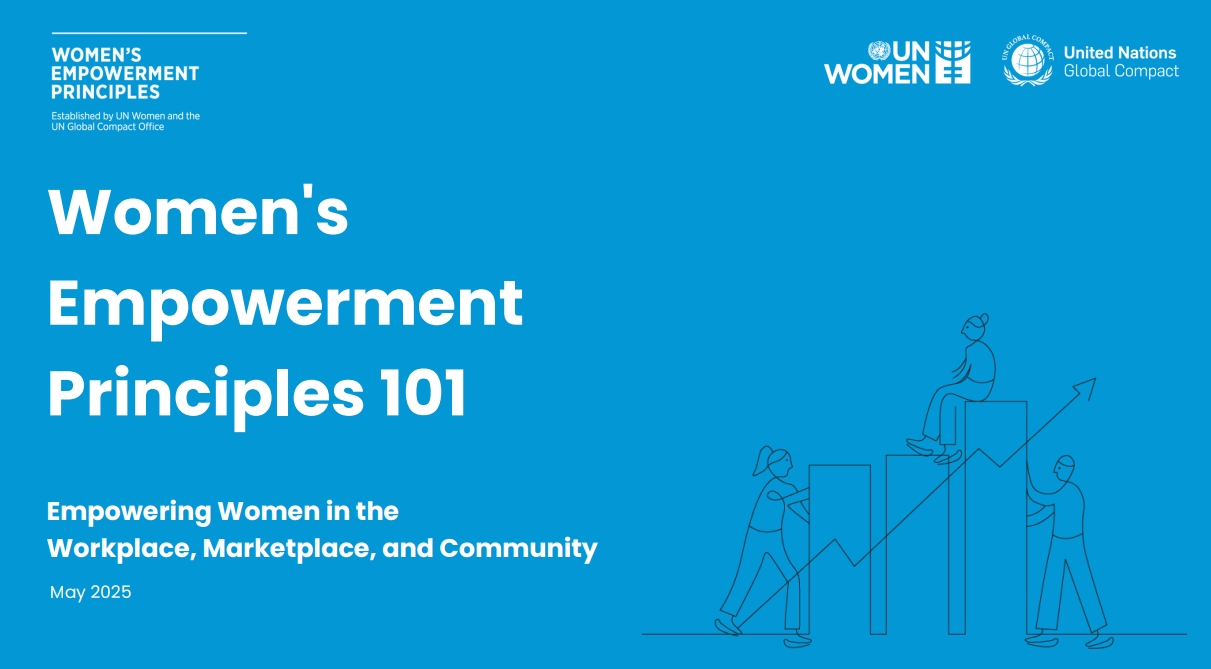On May 7, 2025, UN Women and the UN Global Compact co-hosted the second WEPs 101 webinar of the year, offering companies practical guidance on engaging with the Women’s Empowerment Principles (WEPs). Designed for both new and existing signatories, the session emphasized the WEPs as a globally recognized framework for advancing gender equality across the workplace, marketplace and community.
Chris Kip, Head of Social Sustainability at the UN Global Compact, delivered the opening remarks, reinforcing the WEPs as a strategic business tool and underscoring how gender equality contributes to innovation, performance, and long-term resilience.
Maja Lofstrom of the WEPs Secretariat at UN Women, and Margarita Panagopoulos, UN Global Compact, opened the session by laying the foundation for the WEPs, detailing the seven principles and the tools available to support signatories in their implementation journey. Their framing established a clear link between organizational leadership, practical action, and sustainable gender outcomes.
Following this introduction, Anna Falth, Global Head of the WEPs Secretariat at UN Women, led a dynamic roundtable discussion with three corporate representatives from different regions and sectors. Her facilitation highlighted the importance of contextual leadership in driving institutional change. As Anna noted, “This isn’t just about a company’s internal policies—it’s about shifting behaviour and culture. If you are a leader in your market, your actions can influence the entire ecosystem around you, fostering real normative change in society.”
Among the corporate signatories featured were Banco Agrícola, Ecobank and Orange Jordan, each of sharing insights into how they are embedding the WEPs into their organizational DNA.
Nana Araba, Executive at Ecobank Transnational Incorporated and Co-Chair of the Bank’s Diversity and Inclusion Council, emphasized that gender equality is “an intrinsic part of our business strategy at Ecobank.” The bank’s Group CEO signed the WEPs in 2024, and by early 2025, one-third of Ecobank’s affiliates had also joined the commitment. She reported that the bank’s workforce is now 47% female, with 50% gender parity at the regional executive level. Nana also highlighted the impact of Ellevate by Ecobank, a flagship initiative supporting women-led businesses, which has reached over 73,000 entrepreneurs and facilitated more than $117 million in loans. Reflecting on the WEPs, she stated: “It’s not just about signing a pledge. It’s about delivering tangible results and being transparent about where we are and where we need to improve.”
Alejandro Gómez Fernández, Vice President of Human Talent and Culture at Banco Agrícola, shared how the WEPs became a transformative framework for institutionalizing gender equality at all levels of the organization. Fernández described the initiative as a journey of internal reflection and shared learning: “Our purpose is how to learn from other experiences, share our experience, and go to a higher level of equality. Gender equality is business. It’s about business.” The bank leveraged the WEPs Gender Gap Analysis Tool repeatedly to refine its long-term strategy, establish leadership development programmes for women, and expand its offerings to support women-led SMEs. Through this approach, Banco Agrícola has not only strengthened its internal culture but also created business value by opening new market segments.
Safa Sharif, Transformation and Employee Experience Manager at Orange Jordan, spoke of her company’s strategic commitment to the WEPs, becoming the first telecom operator in Jordan to sign the principles in 2021. Sharif explained that the decision was aligned with the company’s leadership values and its drive to embed global best practices across operations. “We saw this [signing the WEPs] as a strategic decision aligned with our leadership practices and also, of course, to embed global practices and best practices across our organization,” she said. Orange Jordan used the WEPs Gender Gap Analysis Tool to identify key disparities and launched a targeted gender action plan in response. Since then, the company has implemented flexible work policies, created nursing facilities, and introduced mentorship programmes to enhance women’s advancement, particularly in tech and innovation roles. Sharif also emphasized the value of capacity-building efforts, highlighting their participation in sexual harassment training, ongoing technical support from UN Women, and opportunities to engage in both regional and global knowledge exchange forums.
Together, these speakers illustrated how companies from different sectors and regions are embedding the WEPs into their organizational DNA. While each organization’s path was shaped by its unique context, all emphasized the same foundational elements: the importance of data, the role of accountable leadership, and the integration of gender equality as a business imperative rather than a symbolic initiative.
Listen to the recording HERE.

